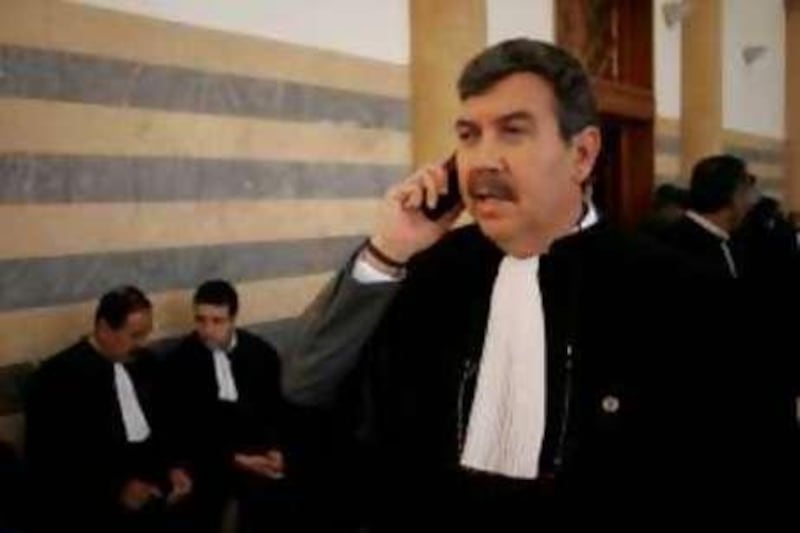RABAT // For 20 years, Mourad Bekkouri's father delivered the sermon each Friday in the mosque in the Moroccan town of Souk el Arbaa, where he cut a dashing figure in his pristine white shirts. Books on Islamic history and Arab literature filled his library at home. "It was from my father that I learned true Islam - pure, modern, and open-minded," said Mr Bekkouri, today a lawyer in Morocco's capital, Rabat.
Last month, Mr Bekkouri, 47, used his legal knowledge to defend his religion when he filed an official complaint against Sheikh Mohammed Maghraoui, a conservative Marrakech scholar who declared on his website that girls as young as nine could marry. Mr Bekkouri said the sheikh's fatwa risked inciting child rape. For many Moroccans, the affair has wider implications, pitting their mainstream brand of moderate Islam against a minority trend of rigid literalism gaining ground in the country.
Human rights groups have denounced Sheikh Maghraoui, state religious leaders declared him unqualified to give fatwas and the courts are investigating him. Authorities have blocked Sheikh Maghraoui's website and closed dozens of Quranic schools run by his organisation, the Association for Call to the Quran and the Sunnah. "I wanted to sound the alarm over this kind of fatwa," Mr Bekkouri said. "It can only give Islam a bad image and provoke disorder in society."
Moroccans take pride in their homegrown Islam, a relaxed faith anchored to the land by local Sufi traditions. Whitewashed mosques with the distinctive square-angled minarets of North Africa rub shoulders with chic cafes in the cities and in the countryside with the zaouias, or holy houses, of Sufi brotherhoods. King Mohamed VI is by law the top religious authority and presides over the High Council of Ulemas, or religious scholars, which alone may legally deliver fatwas.
Sheikh Maghraoui told Al Jazeera he had not given a fatwa, but simply made a recommendation. Moroccan media have reported he is in Saudi Arabia where he maintains strong ties. Sheikh Maghraoui's critics have largely avoided making his fatwa a religious issue. For them, what is at stake is Morocco's identity. "People have a right to express their religious point of view, but Maghraoui went too far by endangering human rights," said Abdelhamid Amine, vice president of the Moroccan Association for Human Rights. "His fatwa shows that our society still harbours backward ideas."
"Sheikh Maghraoui doesn't want to progress," said Abdeltif Hatimy, president of the Forum for Dignity and Human Rights, an Islamic human rights group. "But God gave us a brain to adapt our lives to our era." "The environment I grew up in was religious, but modern," Mr Bekkouri said. His father studied at the fabled Al Qaraouine University in Fez, taught Arabic in the local school and delivered the Friday sermon from 1976 to 1996 in Souk el Arbaa. When he died six years ago, his book collection passed to his son.
"I learned beautiful things about Islam and my father's sermons had nothing in common with these Salafis." Salafism is a Sunni Islamic movement whose followers seek to model their lives on the first three generations of Muslims. Wahhabism, the official creed of Saudi Arabia, is considered a branch of Salafism. The movement reached Morocco in the early 20th century with Moroccans returning from religious studies in the Middle East.
In recent decades, the movement has grown and occasionally turned violent. Moroccan jihadist Salafis struck the commercial capital, Casablanca, with suicide bombings in 2003 and 2007, and were implicated in the 2004 Madrid train bombings. Sheikh Maghraoui has not been associated with violence, but many Moroccans see scholars like him as a part of a culture clash. "We live in an age of religious conflict, and in Morocco, that plays out in political currents," said Taoufik Mousaif, a Rabat lawyer who often defends Salafis arrested on terrorism-related charges. "It's Sheikh Maghraoui versus the human rights organisations, who lean left politically and espouse western norms."
Morocco has embarked on social reform in the past few years, including the introduction in 2004 of a family code that strengthened women's status and made 18 the minimum age for marriage. But beneath the surface is a deeply traditional society where conservative Islam has laid roots. Across Rabat from Mr Bekkouri's office stands the Mesjid al Felah, a mosque popular with local Salafis. It is embedded in the walls of the old medina, where streets free of cars are clogged instead with vendors, beggars and crowds of robed shoppers endlessly drifting.
Outside the mosque door, a line of men stand, kneel and prostrate themselves in unison on a reed mat. Some wear the rough jeans and flannel shirts of Morocco's working class, others long white robes and beards like those in the Gulf. "I follow Islam as it was followed by the Prophet, peace be upon him, and the first Muslims," said one of the worshippers, an engineer named Mohammed. "And I agree with Sheikh Maghraoui's opinion."
Mohammed is reluctant to call himself a Salafi. "I prefer just to say that I'm a Muslim," he said. In the medina nearby, Zobeir, a security guard, is more forthright. "I'm a Salafi," he declares proudly. "Those who criticise Sheikh Maghraoui do so without right, because they're not theologians." Beside him, his young son peers into the window displays. Zobeir reaches out to pat the boy's hair as he darts past.
"I'm not against the government," he said. "I love our country and our king. I'm a Moroccan." @Email:jthorne@thenational.ae





